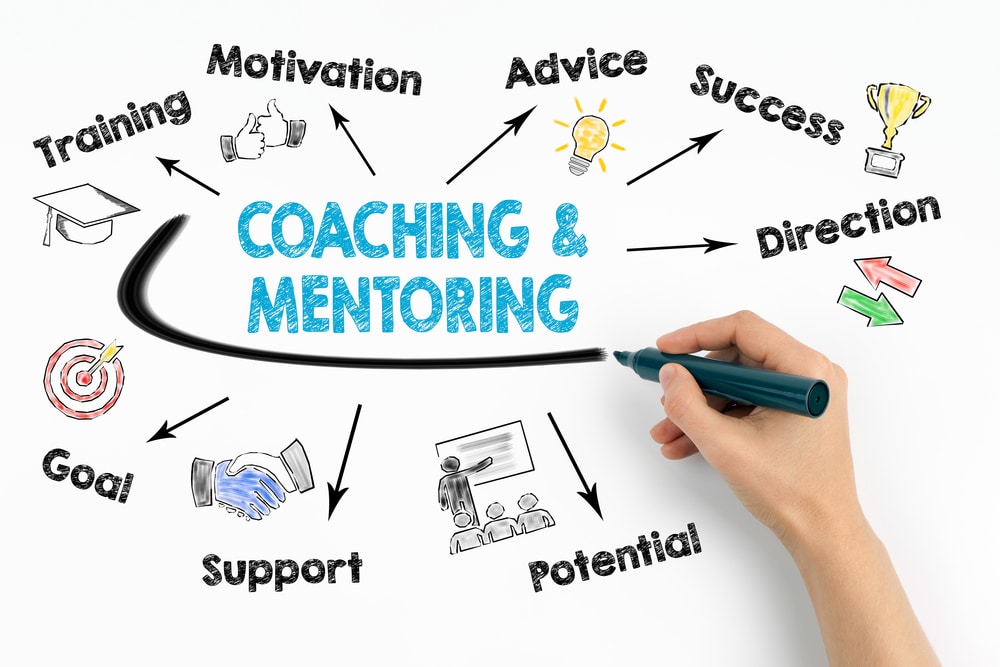
A business mentor uses their knowledge and experience to help business owners with development and expansion. They provide direction, help identify new growth opportunities and offer advice on steering clear of common business pitfalls.
Having a mentor provides access to improved decision-making processes, strategic planning insights, and effective risk management strategies. This relationship can significantly impact business performance, enhancing efficiency and competitiveness in the market.
In this article, we explore the positive effect mentorship has on small businesses, providing them with the tools and knowledge necessary for sustained growth and success.
Leveraging Experience and Expertise
How working with a small business mentor can help you achieve continuous organisational growth:
Learning from the Mentor’s past Successes and Failures
Understanding the mentor’s journey:
Explore the mentor’s professional background to understand their successes and failures. This insight often identifies lessons you can apply to your own business.
Applying lessons learned:
Analyse how the mentor navigated past challenges and successes. Adapt these strategies to fit your business model, ensuring they align with your specific goals and industry.
Adapting Best Practices to Your Business Model
Identifying relevant best practices:
Work with your mentor to identify successful industry-specific best practices. This could include operational efficiencies, customer service strategies, or marketing tactics.
Customising strategies for your business:
Tailor these best practices to suit your business’s unique needs and objectives. This might involve modifying certain approaches to better align with your company’s culture, customer base, or market position.
Building a Productive Mentor-Mentee Relationship
Here are some of the ways a mentor-mentee relationship can become a powerful tool for personal and professional development:
Establishing Effective Communication
Effective communication is the cornerstone of a successful mentor-mentee relationship. It involves regular and structured meetings plus an openness to share ideas, challenges, and feedback.
Both parties should feel comfortable expressing their thoughts and concerns. This can be achieved through agreeing on plans for communication, acceptable to both parties, at the beginning of the relationship, including preferred methods of communication (e.g., email, phone calls, face-to-face meetings) and frequency of interactions.
Setting Expectations and Boundaries
Clear expectations and boundaries include understanding the scope of the mentor’s role, the goals of the mentorship, and the duration of the relationship. Both mentor and mentee should agree on what is expected in terms of commitment, confidentiality, and the level of support provided.
Setting these boundaries from the start helps prevent misunderstandings and ensures the relationship remains focused and professional.
Promoting Mutual Respect and Trust
Building mutual respect and trust involves showing appreciation for each other’s time and expertise, being reliable and consistent in interactions, and maintaining a professional demeanour.
Trust is developed over time through consistent, honest, and respectful communication. It allows for a more open and effective exchange of ideas and advice.
Encouraging Proactive Engagement
Mentees should come prepared to meetings with questions and updates on progress, and be open to receiving advice and constructive criticism. Mentors should actively listen, provide relevant and timely feedback, and offer guidance based on their experience and expertise.
Navigating Challenges Together
A mentor should provide support during difficult times. This involves working together to identify problems, brainstorm potential solutions, and develop strategies to overcome obstacles. The mentor’s role is not to solve problems for the mentee but to guide them in finding their own solutions and learning from the experience.
Evaluating and Adjusting the Relationship
Regular evaluation of the mentor-mentee relationship is important to ensure it remains effective and meets the evolving needs of the mentee. This could involve revisiting goals, assessing the progress made, and making adjustments to the mentoring approach if necessary.
Both parties should feel comfortable discussing what is working well and what could be improved.
Overcoming Challenges with Mentor Support
Incorporating a small business mentor into your strategy helps in overcoming immediate hurdles but also in improving your confidence and capability of meeting future challenges while building a stronger, more resilient business.
Business Challenges and Setbacks
Understanding the nature of challenges:
Every business faces unique challenges, and a small business mentor can help in identifying the root causes and potential solutions.
Developing resilience:
Mentors provide guidance on building resilience, helping businesses to bounce back from setbacks and maintain a positive trajectory.
Crisis Management
Strategic advice during crises:
In times of crisis, a mentor’s experience becomes invaluable, offering strategic advice and practical steps to mitigate risks.
Emotional support and reassurance:
Beyond business strategies, mentors also provide emotional support, helping business owners maintain clarity and confidence during tough times.
Adapting Strategies for Sustainability
Revising business plans:
Mentors assist in revising business plans to adapt to changing market conditions, ensuring long-term sustainability.
Implementing effective change management:
They guide in implementing changes smoothly, minimising disruption and maximising the benefits of new strategies.
Learning from Challenges for Future Growth
Extracting lessons from setbacks:
A key role of a mentor is to help businesses learn from their setbacks, turning challenges into opportunities for growth.
Preparing for future challenges:
Mentors also prepare businesses for future challenges, equipping them with strategies and tools to navigate uncertainties effectively.
Measuring the Impact of Mentorship
The following strategies for measuring the value gained from mentorship ensure businesses can effectively gauge the return on investment of their mentorship engagement. This process highlights the immediate benefits and also underscores the long-term, sustainable growth and development enabled through mentorship.
Tracking Progress and Evaluating Success
Establishing Key Performance Indicators (KPIs):
To measure the effectiveness of mentorship, identify specific KPIs in alignment with your business goals. These could include revenue growth, customer acquisition rates, or operational efficiency improvements. By regularly monitoring these indicators, you can assess how the guidance and strategies provided by your mentor are translating into real business outcomes.
Regular Review Meetings:
Schedule periodic meetings with your mentor to review progress against your set goals. These sessions are opportunities to discuss challenges, celebrate successes, and recalibrate strategies as necessary. It’s a time for reflective learning and for the mentor to provide insights into your business’s progress.
Adjusting Strategies Based on Feedback and Results
Responsive Strategy Modification:
Your business aims and strategies may need to be adjusted in response to market changes, customer feedback, or operational challenges. Your mentor can provide valuable perspective on when and how to pivot your strategies to stay aligned with your business objectives.
Continuous Improvement:
Mentorship is about fostering a mindset of continuous improvement. Your mentor can help you identify areas for ongoing development and refinement in your business practices, ensuring your business remains competitive and adaptable.
Feedback Loop: Learning and Adapting
Implementing Mentor Feedback:
Constructive feedback from your mentor is a key component of the mentorship process. It’s important to be open to their suggestions and insights and to implement changes to drive your business forward.
Self-Reflection and Learning:
Part of the mentorship journey involves self-reflection. Assessing your own performance and learning from both successes and failures is key to personal and professional growth. Your mentor can guide you in this reflective process, helping you to develop deeper insights into your business and leadership style.
Long-Term Impact Assessment
Evaluating Long-Term Business Growth:
While some benefits of mentorship may be immediate, the true value often becomes apparent over the long term. Assess how your business has evolved since engaging with a mentor, considering the market position, brand strength, and overall financial health.
Personal and Professional Development:
Beyond business metrics, evaluate how mentorship has contributed to your growth as a leader and entrepreneur. This might include improved decision-making skills, enhanced leadership abilities, and a broader business network.
The Selection Process: Choosing the Right Mentor
A mentor who possesses the right qualities can be a valuable asset in running a successful small business.
Qualities of an Effective Small Business Mentor
Expertise and Experience:
A mentor with a strong background in your industry can provide invaluable insights. Look for someone who has a proven track record of success and can share real-world experiences.
Communication Skills:
Effective mentors communicate clearly and can adapt their mentoring style to suit your needs. They should be able to articulate ideas and provide feedback to resonate with you.
Commitment to Mentoring:
A good mentor is genuinely interested in your success and is willing to invest time and effort into your development. They should be approachable, available, and committed to the mentoring relationship.
How to Find a Mentor for Your Business
Networking Events and Industry Conferences:
Attend events relevant to your industry to meet potential mentors. These settings often prompt professional relationships.
Professional Associations and Groups:
Joining industry-specific associations can connect you with experienced professionals who are open to mentoring.
Online Platforms and Social Media:
Utilise LinkedIn and other professional social networks to search for mentors. Many experienced professionals indicate their willingness to mentor on their profiles.
Referrals from Peers and Colleagues:
Sometimes the best way to find a mentor is through a recommendation from someone in your network who understands your business needs.
Achieving Business Excellence with Business Coach Mark
Partnering with Business Coach Mark for small business mentorship offers a wealth of benefits for the growth and success of your enterprise. His expertise, tailored approach, and commitment to your business’s unique needs provide a comprehensive support system for entrepreneurs and business owners.
Using Business Coach Mark’s experience, you can expect a significant improvement in your decision-making and strategic planning skills. His insights and guidance help you navigate complex business scenarios, leading to more informed, strategic, and impactful decisions.
Regular mentoring sessions with Business Coach Mark provide continuous support and keep you focused on your goals, ensuring steady progress in the growth of your business and your own business skills.
From personalised strategies and improved decision-making to expanded networks, ongoing support, and effective problem-solving, Business Coach Mark is invaluable in driving your business towards greater success and sustainability.






